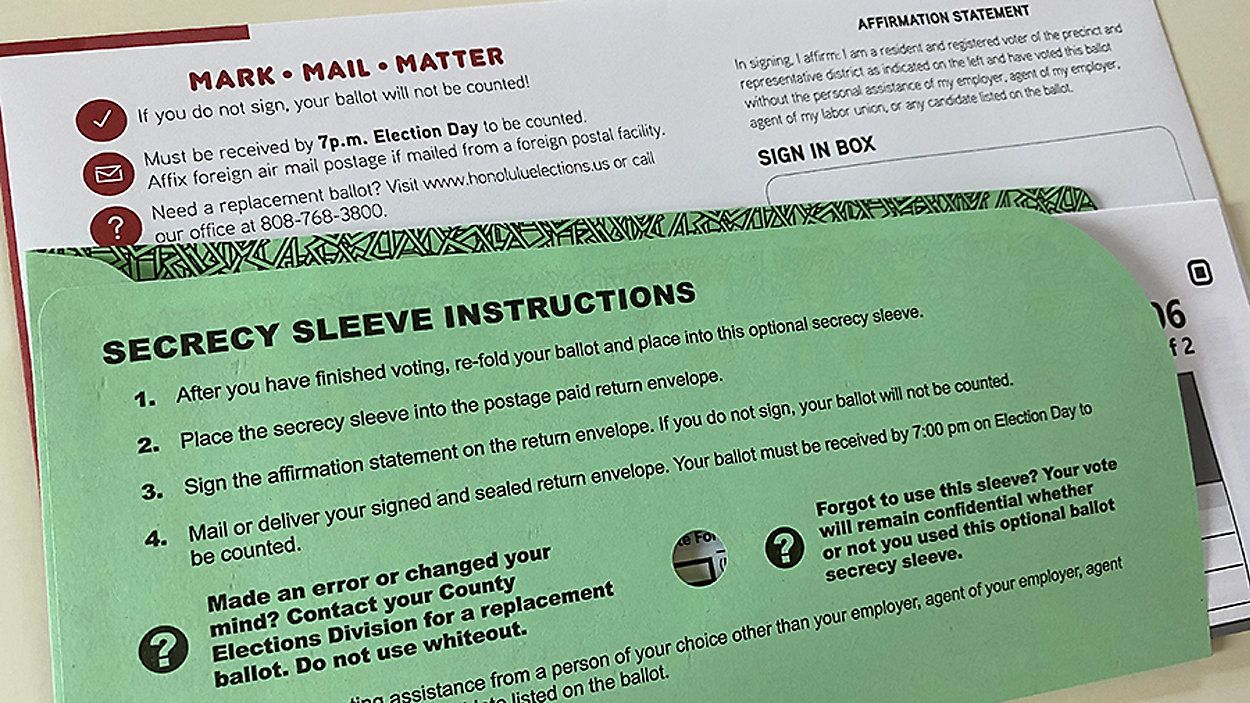County Council candidate Noelani Ahia is contesting the results of the Council race for the Wailuku-Waihee-Waikapu district, which she lost to incumbent Council chair Alice Lee in the Nov. 8 general election.
Ahia, joined in the Hawaii Supreme Court filing by 30 Maui County voters, is seeking to have the results of the election voided and a new election ordered on the basis that Maui County Clerk Kathy Kaohu’s handling of 800-plus deficient ballots caused the result of the election not to be known.
“We must do everything possible to protect the right to vote and ensure that every vote is counted. We need to ensure confidence in our election system, especially for all the first-time voters,” Ahia said.
Lee led Ahia by 513 votes in the last reported tally on Nov. 21.
On Election Day, the clerk ruled more than 800 mailed-in ballots were deficient due to return envelopes either lacking a required signature, a signature not matching what is already on file, and other defects or errors.
Voters have five business days to correct or “cure” deficiencies. Prior to the election, voters were notified of their deficient ballot within one or two days. According to Ahia’s filing, the clerk’s office did not mail out notices of deficiency until Saturday, Nov. 12, four days after the election, and voters did not receive them until the following Tuesday, Nov. 15, leaving them just a day to correct their ballot.
The timeline is complicated; however, by the Veteran’s Day holiday of Nov. 11 and the weekend, which do not count toward the five business days. Technically, ballots were mailed out on the weekend between the second and third business days.
Ahia’s attorney Lance Collins said the complaint is based on six counts directly related to Kaohu's alleged mishandling of deficient ballots:
- By not notifying voters of deficient ballots earlier, the city clerk violated her duty to reasonably notify voters that she was not counting their ballots
- The city clerk and her staff did not properly evaluate ballots, resulting in some valid ballots being misidentified as deficient.
- The city clerk violated open records laws by not fulfilling Ahia’s request for a list of names of voters whose ballots they deemed deficient (Ahia had intended to contact the voters directly of the deficiency and encourage them to correct their ballot by the deadline).
- The city clerk and her staff used different procedures for notifying voters before and after partial results were available, which constituted “unbridled” or “standardless” discretion.
- The city clerk violated the constitutional right to equal protection by using the different notification procedures.
- The city clerk violated due process by failing to reasonably notify voters that their ballots were being held.
Kaohu did not respond to a request for comment.
Collins said the court could grant Ahia’s request if it finds that any or all of the counts substantially prejudicial.
Collins said Ahia is pursuing the complaint not just to extend her chance of winning the seat but to assure that every vote counts.
“This is only our second all-mail-in election,” Collins said. “This is a significant issue that needs to be addressed. If not, election officials will not feel any obligation to comply with the law.”
There’s precedent for Ahia’s request for a new election.
In 1969, state House of Representatives candidate Clarence Akizaki successfully contested his narrow loss to Hiram Fong Jr. because the final tally included invalid absentee ballots that arrived after the deadline for receipt. Fong later won a special election over Akizaki in 1970.
More recently, the state Supreme Court invalidated the results of the 2018 Honolulu City Council race between Tommy Waters and Trevor Ozawa after it ruled that election officials improperly counted 350 late absentee ballots. Waters prevailed in the subsequent special election.
Michael Tsai covers local and state politics for Spectrum News Hawaii.



